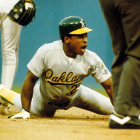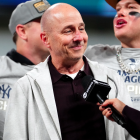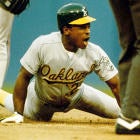 |
| Are baseball players like Bartolo Colon who use PEDs more strongly condemned than football players who do the same? (Getty Images) |
The recent suspensions of Melky Cabrera and Bartolo Colon -- two players central to the ongoing playoff races -- for failed PED tests have given fans occasion for outrage. That's understandable, to a reasonable extent: rules are in place, and the breaking of rules is an act worthy of sanctioned punishment and, if being scandalized is your thing, heavy doses of scorn.
As the latter consequence goes -- the scorn -- it seems to me that MLB players are subject to more of it than are their NFL counterparts. Admittedly, that's a subjective perception, but it does seem that PED suspensions for football players are met with varying levels of indifference, while baseball players committing the same offense are much more vigorously denounced in the public square. Why is that?
On the one hand, I suppose it's understandable. The gladiatorial nature of football leads to a sort of "do what you must do in order to compete" line of thought from those who, from the safety of their sofas, demand entertainment through violence. After all, steroid use has been a part of the NFL since the 1960s, so we're used to it. Has the widespread use of anabolics among, say, the Steelers of the 1970s diminished that dynasty's standing? Not perceptibly.
It probably also has something to do with baseball's emphasis on individual records. As pointed out countless times before, the individual home run record, to cite but one example, has much more cultural heft than the all-time rushing record. The perception that PED use has materially contributed to the toppling of those cherished baseball records advances the hand-wringing.
Baseball has also never shrunk from its image as the purer sport. Whether it's football's militaristic parlance or baseball's reputation as some kind of timeless echoing of our pastoral origins, it's baseball about which the poets have rhapsodized for years. No, the game was never any kind of embodiment of youthful innocence, but that's what we imagine it to be. For those who have indulged in such myth-making, the notion of PED use in baseball is hard to abide.
With all that said, though, the NFL's richer and deeper history of PED use should invite more outrage. Let's be frank: while we're not certain to what extent steroid use affects a player's ability to play baseball, we do know that it makes a much better football player. Football, of course, is a sport that relies on size and raw strength to a much greater extent than does baseball. To gaze upon your average NFL player and see nothing but the work of genetic good fortune and hard work requires a level of credulity that should elude you.
Moreover, that the cycling of anabolic steroids leads to bigger and stronger football players and, hence, to on-field violence of an increasing scale should concern those who worry about the future of football and those who play it. The NFL tests for PEDs, yes, but when those tests turn up positive, it's back-page stuff. In 2006, Shawne Merriman made the Pro Bowl after testing positive for steroids. In 2010, Brian Cushing won a re-vote for AP Defensive Rookie of the Year despite having tested positive for banned substances. And so on.
Still and yet, it's baseball players who are subjected to public floggings far more often. That's fine, as it goes, but it's curious that such unequal treatment persists despite what we know about steroid use in football. Put simply, steroids in football almost certainly have a greater effect on competitive integrity than they do in baseball, they've been around longer in football, and they help make it a far more dangerous game.
So why don't we care?
For more baseball news, rumors and analysis, follow @EyeOnBaseball on Twitter, subscribe to the RSS feed and "like" us on Facebook.
















